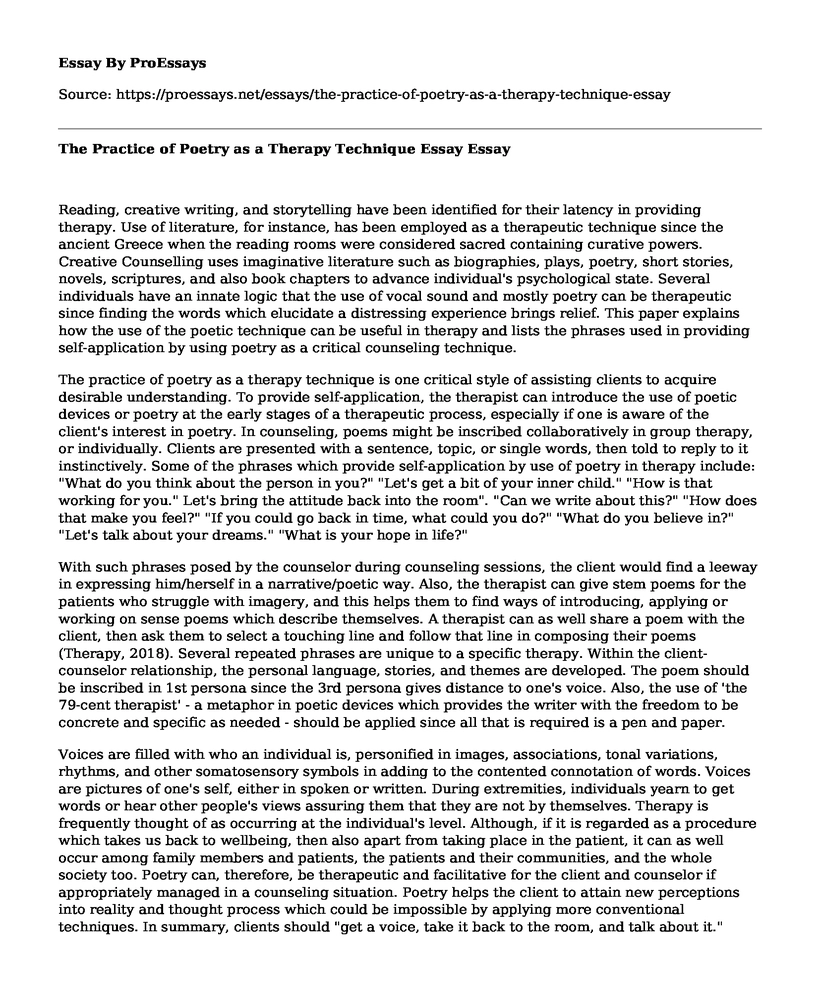Reading, creative writing, and storytelling have been identified for their latency in providing therapy. Use of literature, for instance, has been employed as a therapeutic technique since the ancient Greece when the reading rooms were considered sacred containing curative powers. Creative Counselling uses imaginative literature such as biographies, plays, poetry, short stories, novels, scriptures, and also book chapters to advance individual's psychological state. Several individuals have an innate logic that the use of vocal sound and mostly poetry can be therapeutic since finding the words which elucidate a distressing experience brings relief. This paper explains how the use of the poetic technique can be useful in therapy and lists the phrases used in providing self-application by using poetry as a critical counseling technique.
The practice of poetry as a therapy technique is one critical style of assisting clients to acquire desirable understanding. To provide self-application, the therapist can introduce the use of poetic devices or poetry at the early stages of a therapeutic process, especially if one is aware of the client's interest in poetry. In counseling, poems might be inscribed collaboratively in group therapy, or individually. Clients are presented with a sentence, topic, or single words, then told to reply to it instinctively. Some of the phrases which provide self-application by use of poetry in therapy include: "What do you think about the person in you?" "Let's get a bit of your inner child." "How is that working for you." Let's bring the attitude back into the room". "Can we write about this?" "How does that make you feel?" "If you could go back in time, what could you do?" "What do you believe in?" "Let's talk about your dreams." "What is your hope in life?"
With such phrases posed by the counselor during counseling sessions, the client would find a leeway in expressing him/herself in a narrative/poetic way. Also, the therapist can give stem poems for the patients who struggle with imagery, and this helps them to find ways of introducing, applying or working on sense poems which describe themselves. A therapist can as well share a poem with the client, then ask them to select a touching line and follow that line in composing their poems (Therapy, 2018). Several repeated phrases are unique to a specific therapy. Within the client-counselor relationship, the personal language, stories, and themes are developed. The poem should be inscribed in 1st persona since the 3rd persona gives distance to one's voice. Also, the use of 'the 79-cent therapist' - a metaphor in poetic devices which provides the writer with the freedom to be concrete and specific as needed - should be applied since all that is required is a pen and paper.
Voices are filled with who an individual is, personified in images, associations, tonal variations, rhythms, and other somatosensory symbols in adding to the contented connotation of words. Voices are pictures of one's self, either in spoken or written. During extremities, individuals yearn to get words or hear other people's views assuring them that they are not by themselves. Therapy is frequently thought of as occurring at the individual's level. Although, if it is regarded as a procedure which takes us back to wellbeing, then also apart from taking place in the patient, it can as well occur among family members and patients, the patients and their communities, and the whole society too. Poetry can, therefore, be therapeutic and facilitative for the client and counselor if appropriately managed in a counseling situation. Poetry helps the client to attain new perceptions into reality and thought process which could be impossible by applying more conventional techniques. In summary, clients should "get a voice, take it back to the room, and talk about it."
Reference
Therapy, T., & Therapy, P. (2018). Poetry Therapy. Goodtherapy.org. Retrieved 14 April 2018, from https://www.goodtherapy.org/learn-about-therapy/types/poetry-therapy
Cite this page
The Practice of Poetry as a Therapy Technique Essay. (2022, May 09). Retrieved from https://proessays.net/essays/the-practice-of-poetry-as-a-therapy-technique-essay
If you are the original author of this essay and no longer wish to have it published on the ProEssays website, please click below to request its removal:
- Research Paper on Personal-Centered Therapy
- Essay Sample on Adolescent Health
- Meditation: A Time-Honored Practice for Rejuvenation & Reflection - Essay Sample
- Essay Example on Lilly's Journey to Change: 'The Secret Life of Bees'
- Essay Example on LGBT Influencers Who Committed Suicide: 2 Inspirational Stories
- Paper Example on Exploring Experiential Marketing, Consumer Purchase Behaviour, Value, and Positivism
- Social Experiments and Authority Dynamics: Unveiling Human Behavior and Challenges in Leadership - Report Example







